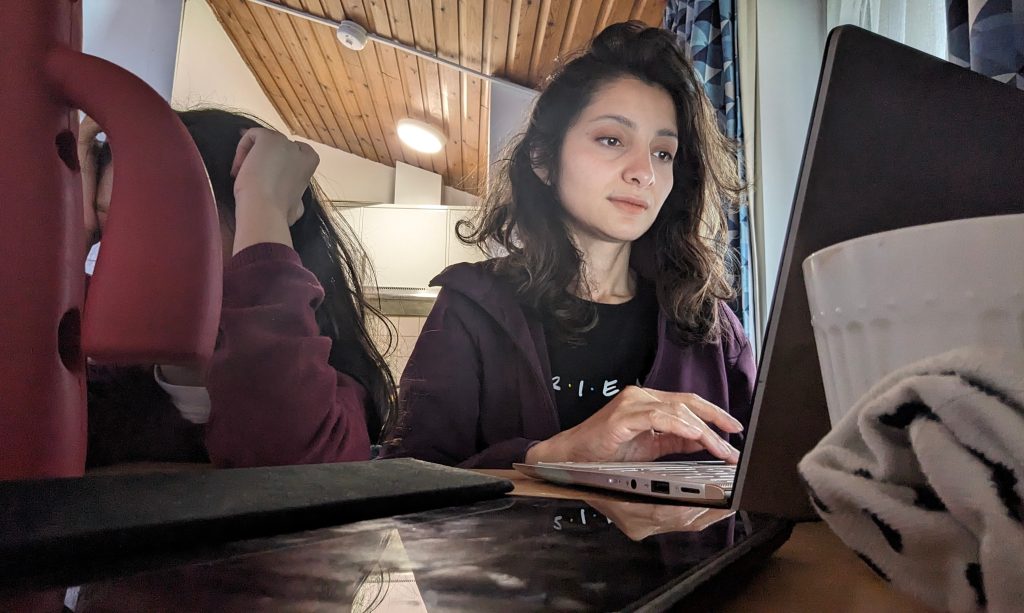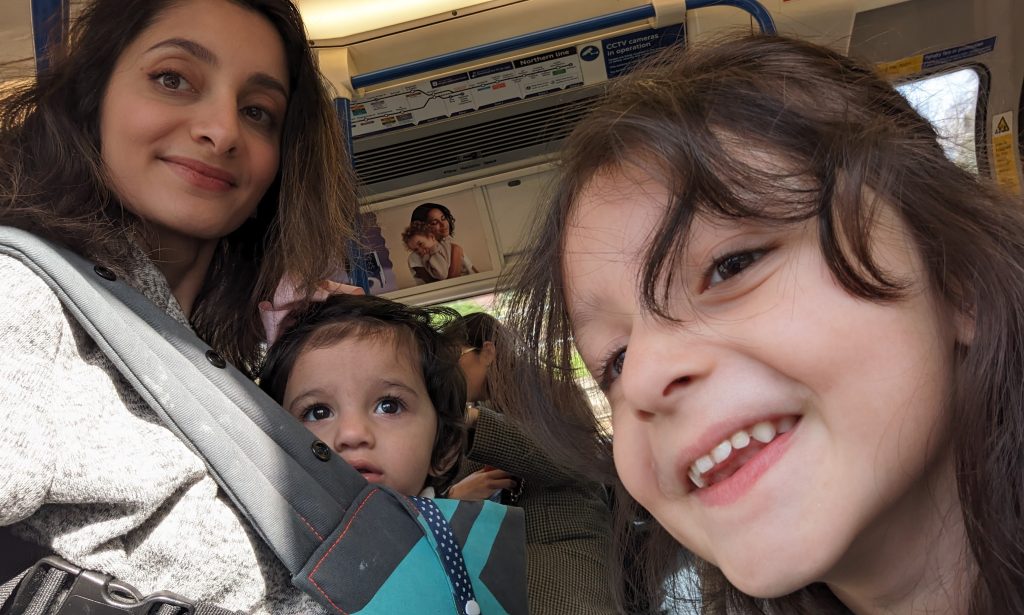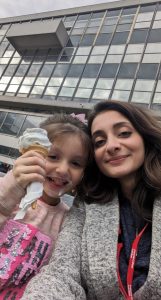Blog by Laila Kasuri, PhD Student, Centre for Environmental Policy
As a mum doing a PhD, I get my fair share of sympathetic yet awkward remarks. After all, very few of my colleagues inhabit the world that I am in. Instead of telling them unrelatable stories of how my kid who is teething kept me up all night, I tell them about Michelle Yeow’s character, Evelyn, in Everything, Everywhere all at once. Like Evelyn, I often find myself in two different universes, each encapsulating two different identities of myself. In one, I could be learning new approaches and methods, producing posters and learning to present my research in an ‘engaging’ way, while in another universe, I am sleep-training my 1-year-old, attending reading mornings at my 4 year-old’s school and visiting the GP once a week for vaccinations, postpartum visits, measles, colds, vaccinations, and a never-ending slew of other sicknesses. Then, there are the logistical challenges of managing a house, figuring out childcare, coordinating school pick-ups and drop-offs, meal prepping and laundry for a family of four and then trying to find yourself amidst the endless slew of chores. Sometimes, these universes overlap in undesirable ways, for example when I was forced to take a 30-minute nap in an office full of PhD students because of sleep deprivation, only reminding me that I am a mom, a house manager and a PhD student everywhere, all at once.
But I list these challenges not to scare anyone – instead, I want to point out that in spite of these challenges that seem unsurmountable, pursuing a PhD as a mum is very doable, if not conducive to raising kids, because of the flexibility it affords in comparison to full-time work, not to mention rewarding. The goal of this post is to offer insights from my personal journey and to provide information on the resources available at Imperial that one can draw upon for support along the way.

If you are a parent, the first thing to know is that there is no universe, not mine nor Evelyn’s where you can manage a PhD without a good advisor. That is not an easy task, so make sure you choose the best advisor, who will support you as a parent as well. Then, it is imperative to have some degree of financial security. This could be in the form of a scholarship, a studentship, or part-time work. At Imperial, there are many such options available, and many of these are not listed on the website so the best thing to do is to email professors who interest you and ask around. Once you find an advisor who you click with, the funding will follow.
Next up, you will need a plan for childcare, whether it is in the form of a spouse, nanny, au pair, or the lucky few who have the ‘grandma’ close by. Luckily, Imperial has its own on-site nursery which has excellent trained staff, healthy meals and the fee is heavily subsidized. There is a wait-list like most good things, but it isn’t terribly long, so if you apply early enough, you will only need to wait a few months.
For housing, here you will need to seek support outside of Imperial. Through Google and word of mouth, we discovered that there are a handful of non-profit housing associations in London that specifically cater to international student families. They provide affordable yet very desirable housing to students across the various universities of London and while the demand for this housing is high and supply is low, if you search and apply early enough, you have a higher chance of getting a housing spot. We went this route and did luck out and were allocated a spot as soon as we arrived in London.
Even though your journey as a PhD parent will be unique and set you apart from your peers, it need not be socially isolating. Imperial offers a range of activities, events and clubs that you can join. In my case, I often participate at the many events that Imperial specifically organizes for its PhD student families through the Imperial International Family Network. This is a great initiative because I have not heard of other universities within the UK that do this. Through this, I have attended some wonderful plays, shows and events, from Cirque du Soleil to Kew Gardens, all with my family and also met other PhD students across the departments. Through these events, I don’t feel like I am missing out socially, not to mention I spend time with my kids AND my parent colleagues.

The last advice I have is on time management and organization. There will be never enough hours in the day to do everything. You will have to build a schedule around your family, because you are a mom doing a PhD, not a PhD student who is parenting. The difference between the two is that your primary responsibility will be taking care and safeguarding your children so your PhD work will be woven into your everyday life, not the other way around. This will usually mean working more from home, spending shorter office hours, saying no to many of the conferences your colleagues are going to and prioritizing the things that need getting done. As much as we would like to have it all, we cannot have it all at the same time.
This last advice is easier said than done, and I imagine it will remain a struggle for parents throughout their lives, outside of a PhD even. But for now, what has helped me the most, and this might resonate with other PhD students who don’t fit the mould – whether they are older, have caring responsibilities or any other attribute that sets them apart – is to surround yourself with peoples, supervisors, staff and colleagues, who will protect and respect your individual journey.

I am not the first mum doing a PhD at Imperial and I won’t be the last. However, I know that our stories are not the norm – indeed we are going against the grain. But there is nothing wrong with forging that path. And for the parents who want to be prospective PhD students here at Imperial, if you want to pursue a doctoral degree, whether it is for a career transition, career progression, personal growth, or simply a passion project, find a good advisor and then take that leap! I say this because not too long ago, I was in your shoes, but I can tell you now that there isn’t anything you can’t do because you’re already doing the hardest (and unpaid) job ever.